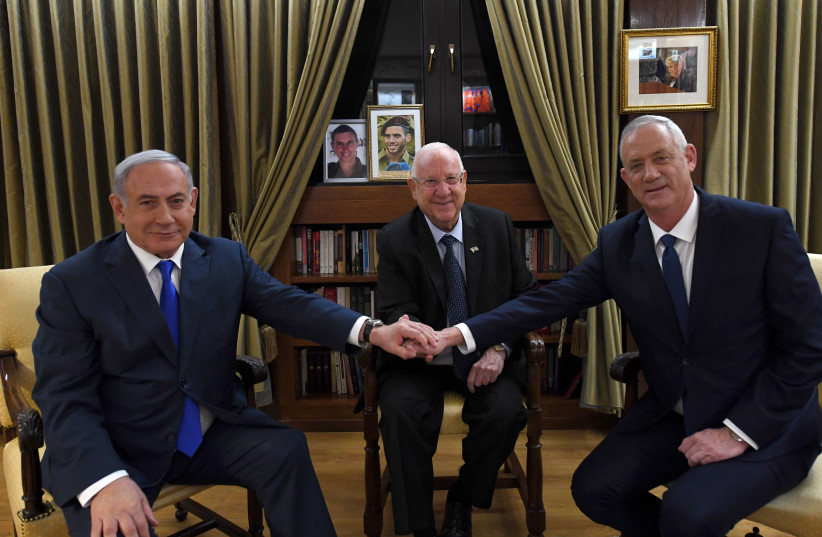Although the cabinet on Monday ultimately passed the 2024 state budget after more than 24 hours of debate, the ministers in Benny Gantz’s National Unity party voted against it, reflecting the fragile and divisive nature of the current coalition.
In the more than 100 days since Hamas’s brutal assault on October 7, there have been sporadic calls for a national unity government to steer Israel through the most challenging period since its establishment in 1948, from both security and economic perspectives, but they have not materialized.
As Israel does all it can to demolish Hamas and return the 136 hostages still being held in Gaza, it faces an escalation of terror on multiple fronts, including in Israel itself, Hezbollah in Lebanon, and the Houthis in Yemen, as well as by their primary sponsor, Iran. A broad national unity government is needed more than ever.
On October 11, Gantz made a bold step in the right direction when he signed a deal with Prime Minister Benjamin Netanyahu to join an emergency war government. The five National Unity members – Gantz, Gadi Eisenkot, Gideon Sa’ar, Chili Tropper, and Yifat Shasha-Biton – became ministers without portfolio, while Gantz and Eisenkot also became members of the war cabinet.
Israel’s 37th government, formed on December 29, 2022, following elections on November 1, comprises seven parties – Likud, United Torah Judaism, Shas, Religious Zionist Party, Otzma Yehudit, Noam, and National Unity. The current coalition has 69 seats in the 120-seat Knesset, including the five MKs from National Unity.

In the spirit of the unprecedented show of national unity and responsibility exhibited by the Israeli public since October 7, this is the right time for our politicians to put their differences aside and rally together.
Yesh Atid leader Yair Lapid should join the unity government
Now is the time for parties in the opposition, headed by Yesh Atid leader Yair Lapid, to join the government – even if it’s only for a limited period.
Yesh Atid’s 24 MKs and Labor’s four would give the coalition a whopping 97 seats in the Knesset. To achieve this, Lapid must drop his demand that Netanyahu kick out Religious Zionism and Otzma Yehudit from the coalition, a demand that has left him out in the cold.
The government should also consider bringing the five members of the United Arab List-Ra’am into the coalition. Ra’am was the first Arab party to join a coalition in the 2021-22 “change government” under Naftali Bennett and Lapid, and its leader, Mansour Abbas, has shown responsible leadership since the start of the war.
In an interview with CNN broadcast on December 1, Abbas became the first Arab party leader in history to publicly call on armed Palestinian factions to demilitarize. “To move forward, the Palestinian militant groups need to throw down their arms,” he said. “They need to work hand in hand with the Palestinian Authority to realize a national movement that will aspire for a state of Palestine in a peaceful solution alongside the State of Israel.”
Israel has had several national unity governments since its inception, the last being the rotation government led by Netanyahu and Gantz from May 2020 to June 2021. The largest was formed before the outbreak of the Six Day War when Levi Eshkol – whose coalition led by the Alignment (Labor’s predecessor) had 75 seats – brought in Herut (Likud’s predecessor), Gahal, and Rafi for the first-ever unity government comprising 111 seats. For the record, it was in office for 38 months, until Eshkol’s death on February 26, 1969.
According to the official Knesset website, a national unity government is one based on a broad coalition, the members of which also include representatives of rival parliamentary groups. “A national unity government is formed due to a state of emergency such as a war, a natural disaster, or an economic crisis that requires a broad mobilization of forces to deal with the situation,” it states.
After the October 7 attack, President Isaac Herzog called for national unity in an address to the nation, declaring: “Let us keep this spirit of heroism and this togetherness. It is our most powerful weapon.”
The time for stocktaking and accountability will come after the war. But if Israel is to emerge as a stronger and more resilient nation, it is essential for its people – and its politicians – to stay united during the war. There is no better way to do this than to form a broad national unity government now.
